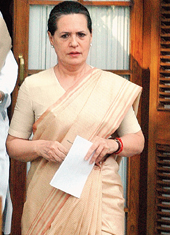When heroes rise
 |
My years with Rajiv and Sonia (Hay House, Rs 499) by R.D. Pradhan contains very little material on the time the author spent with Indira Gandhi’s son; it actually documents the emergence of Sonia Gandhi as an assertive politician. In 1999, the then president, K.R. Narayanan, invited Sonia Gandhi to form the government after the fall of the Atal Bihari Vajpayee regime. At the time, Pradhan was working as an aide to Sonia. The author reveals that Sonia had informed him and the Congress leader, M.L. Fotedar, about her decision to decline the prime minister’s post shortly before her meeting with the president. Pradhan talks about Sonia Gandhi’s journey to political maturity. He aptly captures the political atmosphere in the early 1990s, when Narasimha Rao strengthened his hold on the Congress and Sonia saw her family’s clout in the party waning. She struck back, rendering Rao irrelevant, kept the party together in spite of the “272 fiasco” and even dealt with the hesitation of young Congressmen such as Madhavrao Scindia and Rajesh Pilot, whose unease rose in direct proportion to her confidence. Sonia felt a strong sense of obligation to the political party in which her family had been involved for decades. Her desire was to strengthen the Congress and work for its revival so that India remained a secular and democratic country. Pradhan’s book, though sketchy, comes alive in parts when the author allows himself to be frank.
MARXISM AS SCIENTIFIC ENTERPRISE (Aakar, Rs 295) by P.C. Joshi is a collection of essays in which the author argues that Marxism needs to be redefined to be relevant in modern society. The eminent writer opines that Marxism should go beyond the boundaries defined by the likes of Vladimir Lenin and Mao Zedong. In democratic societies that have witnessed gigantic strides in communication, the templates of conspiracy and ‘people’s wars’ carry far less traction than in autocracies like China. Joshi feels that democracy is ingrained in Marxism as long as it involves a society’s intermediate classes and its intelligentsia. The essays are academic and reflect Joshi’s staunch beliefs.
In the Interests of safety: The absurd rules that blight our lives and how we can change them (Sphere, Rs 350) by Tracey Brown and Michael Hanlon talks about the insanities of our risk-intolerant era. Safety rules, the authors argue, sometimes have more dangerous consequences than the events they seek to prevent. Brown and Hanlon make an amusing comparison between the safety assessment form for workers on an oil rig and the 30-page questionnaire that secondary school teachers in Kent had to fill out before taking children to the beach. The book, obviously, has been written out of a sense of anger, but the writers maintain a great deal of control. They calmly dismantle many myths and assumptions that govern our lives.
 |
The Mahabharata Quest: The Alexander Secret (Westland, Rs 295) by Christopher C. Doyle is a skilfully-written thriller. It connects Alexander’s conquests from the Persian empire to the “land of the Indus” and an ancient secret concealed in the myths of the Mahabharat, a secret that is powerful enough to transform Alexander into a demi-god. In modern times, the ancient tomb of a queen is discovered in Greece; and at the same time in New Delhi, the Intelligence Bureau unearths corpses from a laboratory. Doyle deftly deals with the narrative and plays upon the similarities between the Indian and Greek epics. Through this thriller he explores the enduring quality of the Mahabharat and manages to bring it to life in a modern setting. The tale is gripping till the end, and is filled with plot twists that will keep readers guessing.











